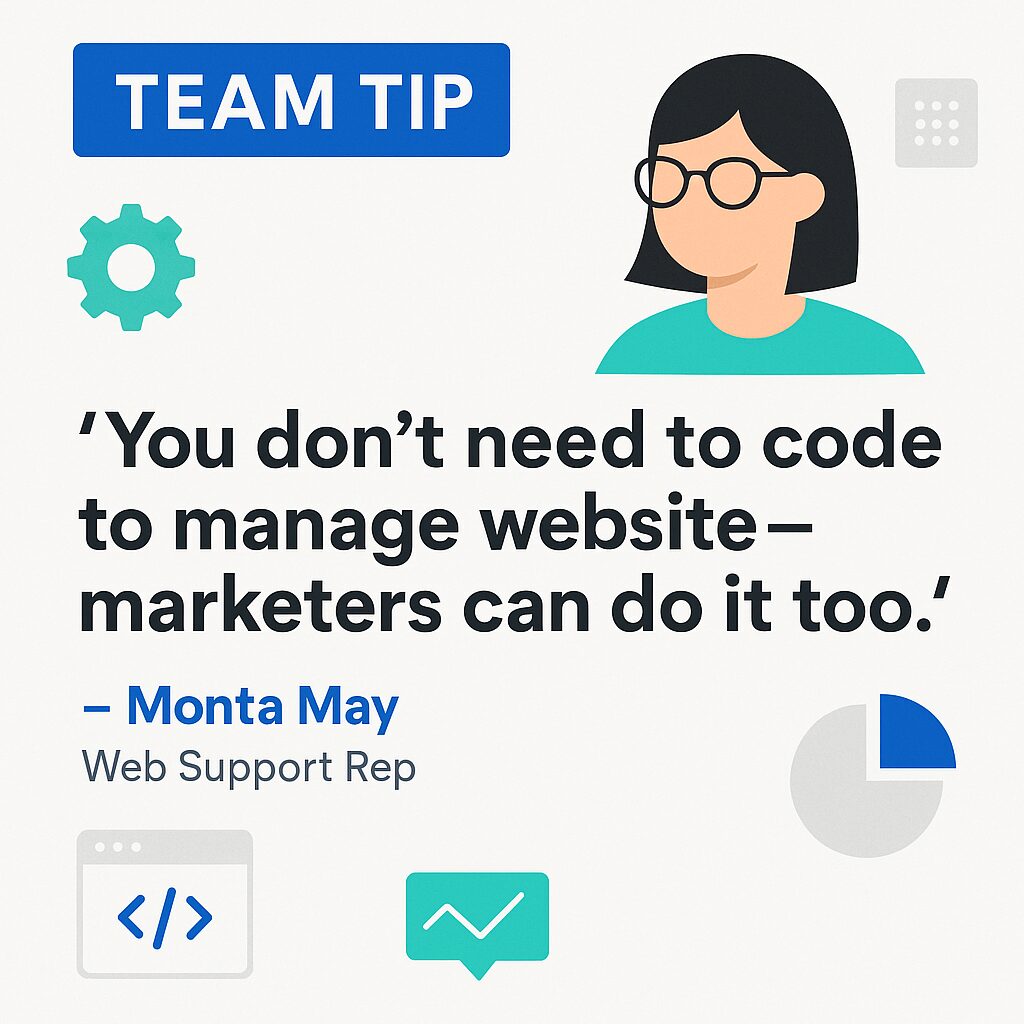TL;DR:
- You Don’t Need to Code to Manage Website Health: Marketers can manage their websites without writing code. From basic checklists to content updates, there are simple ways to maintain site performance and avoid costly disruptions.
- Monthly Walkthroughs Catch Problems Early: A quick monthly review—checking CTAs, forms, page load speed, and content accuracy—can flag issues before they derail campaigns or confuse users.
- Performance Tools Give You Useful Insights: Google Analytics and Search Console help non-technical users track bounce rates, error pages, and load times, guiding smarter marketing decisions without needing a developer.
- Know What Your CMS Needs (and What You Don’t Have to Do): Stay aware of update cycles, plugin changes, and support protocols. You don’t need to run updates yourself, but you do need visibility into who’s handling them and how.
- A Trustworthy Support Partner Makes the Difference: Collaborating with a responsive, marketing-savvy website support team helps avoid downtime, improve conversions, and keep your team focused on strategy, not troubleshooting.
If you’re a marketer responsible for your company’s website but don’t speak HTML or manage servers, this guide is for you.
Here’s how to keep your site running smoothly without a coding background, a full-time IT department, or late-night stress.
Why Smooth Website Operations Matter More Than Ever
Your website is often your first impression, your most consistent sales tool, and your 24/7 hub for lead generation. When it doesn’t work the way it should, your entire marketing strategy suffers.
When your site underperforms, you risk:
- Losing leads due to broken forms or poor UX
- Wasting ad spend when pages don’t load
- Missing revenue opportunities because updates get delayed
- Looking less professional than your competitors
But here’s the good news: you don’t need to be a developer to manage your website effectively.
6 Things You Can Do (Without a Dev Background) to Keep Your Site in Shape
1. Run a Monthly Site Walkthrough
Just like a walk around the shop floor, a quick tour of your website helps catch issues early.
What to check:
- Homepage loads quickly on desktop and mobile
- CTAs are working and up to date
- Forms function correctly and route to the right inbox
- Key product/service pages reflect your latest offerings
Keep a checklist and block 30 minutes each month—it’s worth it.
2. Track Basic Performance Metrics
Tools like Google Analytics and Google Search Console give you data you can act on, even without technical skills.
Focus on:
- Bounce rate and page load time
- Most-visited pages (so you know what matters most)
- 404 error pages or drop-offs in conversion flow
Seeing trends early helps prioritize updates and avoid marketing setbacks.
3. Maintain Content Hygiene
Old content confuses users and hurts credibility.
Check for:
- Outdated team bios or product listings
- Dead links or expired downloads
- Event pages from two years ago still hanging around
Content upkeep is a critical part of website support and well within a marketing team’s skills.

4. Know Your Update Cycle
Every CMS (like WordPress or HubSpot) requires periodic updates to plugins, themes, or backend components. If you work with an agency or IT partner, ask:
- Are plugin updates handled monthly?
- What’s the process if a plugin causes an issue?
- Are backups in place before major updates?
You don’t have to run the updates yourself, but you do need oversight.
5. Test Your Conversion Paths Regularly
Every marketing manager should test their own funnels. It’s the best way to catch friction points that cost leads.
Try this quarterly:
- Submit your main contact or quote form
- Click through your top landing pages
- Download your lead magnet or request a demo
Use the experience to refine conversion rate optimization and ensure a seamless path for users.
6. Build a Support Relationship You Trust
Even the most tech-savvy marketers need backup. Partnering with a team that offers proactive web design and development and support can take the pressure off your plate.
Look for:
- A team that responds quickly and speaks your language
- Processes that don’t require chasing down updates
- Visibility into progress, tasks, and roadmaps
You shouldn’t have to choose between strategy and site stability.
What You Can Safely Skip
Here’s what marketing managers don’t need to stress over as non-developers:
- Diagnosing server issues
- Writing or editing code
- Fixing complex bugs solo
- Managing DNS settings
- Security patches and firewalls
These are the responsibilities of your IT team or agency. Your job is to raise the flag when needed and keep the marketing engine running.
How 3 Media Web Can Help
At 3 Media Web, we help B2B marketing teams stay focused on strategy while we keep the site running in the background.
Our monthly website support plans cover:
- CMS and plugin updates
- Form testing and tracking
- Page speed and uptime monitoring
- Performance audits and accessibility checks
- Conversion support and SEO alignment
We work as your partner so you don’t need to become a developer to manage your most important marketing tool.
